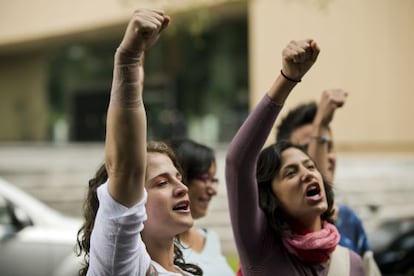Opposition takes Mexico poll to court
President-elect Peña Nieto accused of vote buying and media manipulation

The second-placed candidate in Mexico's presidential election, Andrés Manuel López Obrador, said on Monday he will mount a legal challenge to the result of the July 1 poll, accusing Enrique Peña Nieto of the center-right PRI of buying votes.
Peña Nieto was confirmed the winner on Friday after a final recount, with 38.21 percent to López Obrador's 31.59 percent, but the leftist leader plans to stage a protest march in Mexico City on Saturday.
Six years ago, after losing the presidential election by a narrow margin, López Obrador led weeks of protests that caused disruption in central areas of Mexico City. Third-placed Josefina Vazquez Mota, from the right-wing National Action Party (PAN), has admitted defeat.
But López Obrador of the Progressive Movement coalition is not alone in demanding an inquiry into alleged irregularities. A broad spectrum feels that votes in their parts of Mexico were tampered with.
"It was neither a clean nor fair election," said Eduardo Huchim of the Civic Alliance, a Mexican watchdog group funded by the UN Development Program.
It was the biggest operation of vote-buying and coercion in the country's history"
"This was bribery on a vast scale," added Huchim, a former Federal Electoral Institute official. "It was perhaps the biggest operation of vote-buying and coercion in the country's history."
Accusations of irregularities led to a re-check of about 50 percent of votes after the result was announced on Monday. Following the recount, the country's electoral body said there was no reason not to accept the result.
But López Obrador said the election had been fraudulent and that he would file an appeal next week. He accuses the party of Peña Nieto, the PRI, of paying for votes using gift cards for a supermarket chain. Several videos have emerged of people claiming they received credit in exchange for voting for the former party of state, which ruled continuously from 1929 to 2000.
López Obrador has promised to keep protests peaceful and "act responsibly." López Obrador made the mistake of claiming that the 2006 election was stolen without demanding that the recount results be released - possibly because he didn't believe these would be any more accurate than the original count. He did draw attention to the adding-up problem, but the media ignored this and mostly portrayed him as a sore loser.
Both the 2006 and 2012 elections were manipulated in other ways. A study from the University of Texas shows that there was significant media bias against López Obrador in 2006, and that it was more than enough to swing a close election. About 95 percent of broadcast TV is controlled by just two companies, Televisa and Azteca, and their hostility toward the leftist candidate has been documented.
In the current presidential campaign, the media duopoly ran into criticism for not broadcasting nationally the first presidential debate in May. After student protestors were dismissed in the media as outside agitators, a protest movement against the TV media was launched called "Yosoy#132" ("I am #132"), after 131 of the initial protestors produced a viral video showing their student IDs (that is, to indicate that they were genuine students).
Peña Nieto insists he has done nothing wrong and said he may sue over the allegations. Mexico's Federal Electoral Institute has until early September to address complaints and formally announce a winner.
Tu suscripción se está usando en otro dispositivo
¿Quieres añadir otro usuario a tu suscripción?
Si continúas leyendo en este dispositivo, no se podrá leer en el otro.
FlechaTu suscripción se está usando en otro dispositivo y solo puedes acceder a EL PAÍS desde un dispositivo a la vez.
Si quieres compartir tu cuenta, cambia tu suscripción a la modalidad Premium, así podrás añadir otro usuario. Cada uno accederá con su propia cuenta de email, lo que os permitirá personalizar vuestra experiencia en EL PAÍS.
¿Tienes una suscripción de empresa? Accede aquí para contratar más cuentas.
En el caso de no saber quién está usando tu cuenta, te recomendamos cambiar tu contraseña aquí.
Si decides continuar compartiendo tu cuenta, este mensaje se mostrará en tu dispositivo y en el de la otra persona que está usando tu cuenta de forma indefinida, afectando a tu experiencia de lectura. Puedes consultar aquí los términos y condiciones de la suscripción digital.








































